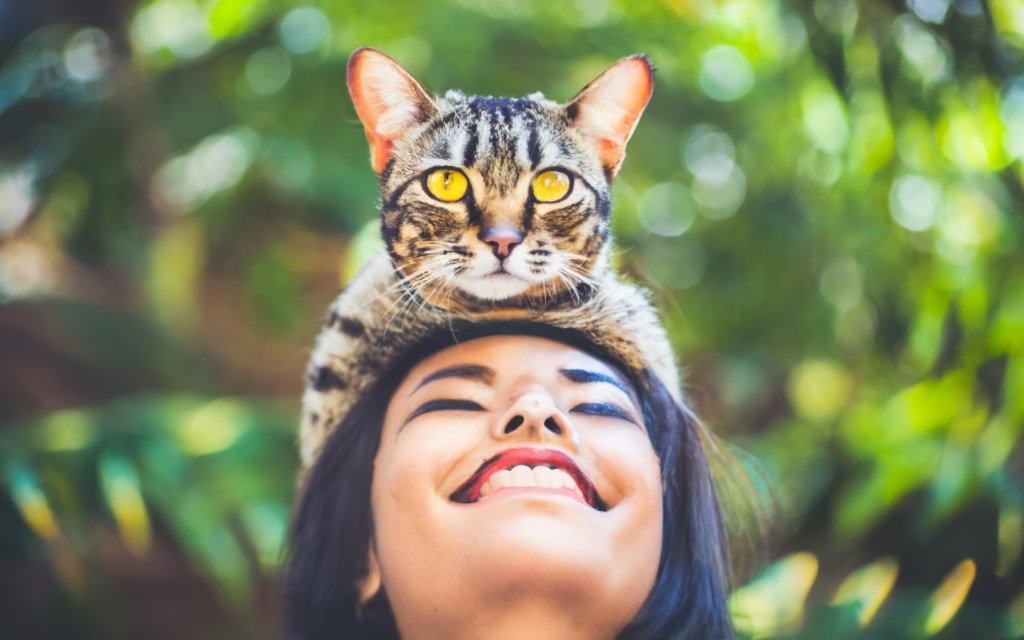
If you are a cat owner, you may have noticed that your furry friend likes to sleep above your head. This may seem cute and cuddly at first, but it can also be annoying or uncomfortable if your cat snores, drools, or takes up too much space on your pillow. You may also wonder why your cat does this in the first place. Is it a sign of affection, security, or dominance?
In this blog post, we will explore the possible reasons why your cat sleeps above your head and what it means for your relationship with your cat. We will also give you some tips on how to stop your cat from sleeping on your head if you prefer to have some personal space at night.
Cat Sleeping on Head Meaning and Benefits
There are several possible reasons why your cat sleeps above your head. Some of them are:
- Your cat is seeking warmth. Your head emits the most heat, so your cat likes sleeping above it because it's super warm. Cats have a higher body temperature than humans, so they enjoy warm environments. According to a study by Cornell University College of Veterinary Medicine, cats prefer temperatures between 86°F and 97°F (30°C and 36°C), which is higher than the average human body temperature of 98.6°F (37°C). Sleeping on your head may help your cat regulate their body temperature and conserve energy.
- Your cat feels secure and comfortable. Sleeping on your head may make your cat feel safe and protected from predators. In the wild, cats are vulnerable to attacks from larger animals, especially when they are sleeping. By sleeping on your head, your cat may feel that they are hiding behind you and using you as a shield. They may also like the sound of your heartbeat and breathing, which can be soothing and relaxing for them. According to Dr. Nicholas Dodman, a professor of animal behavior at Tufts University, cats are attracted to rhythmic sounds that remind them of their mother's purr. Sleeping on your head may also make your cat feel more comfortable by reducing their exposure to light, noise, and drafts.
- Your cat wants to show you affection. Sleeping on your head may be a way of bonding and socializing with you. Your cat may also like the smell of your hair and scalp, which is unique to you. They may want to mix their scent with yours, which is a sign of trust and friendship . According to Dr. Marty Becker, a veterinarian and author of "The Healing Power of Pets", cats have scent glands on their cheeks, chin, forehead, ears, and tail that secrete pheromones. These pheromones are chemical signals that convey information about their identity, mood, and territory. By rubbing their face or body on you, your cat is marking you as their own and expressing their affection for you.
These reasons show that your cat sleeping above your head is not a bad thing. It means that your cat loves you and considers you as part of their family. It also means that your cat is happy and content with their life with you.
How to Stop My Cat from Sleeping on My Head
However, not everyone enjoys having their cat sleep on their head. Some people may find it irritating or disturbing, especially if they have allergies, asthma, or insomnia. Some people may also worry about suffocating their cat or getting bitten or scratched by them in their sleep.
If you want to stop your cat from sleeping on your head, here are some tips that you can try:
- Provide an alternative sleeping spot for your cat. You can get a cozy bed, blanket, or pillow for your cat and place it near your bed or somewhere else in the house where they feel comfortable. You can also add some of your clothes or items that have your scent on them to make the spot more appealing for your cat. You can then gently move your cat to their new spot whenever they try to sleep on your head and reward them with treats or praise when they stay there. For example, you can use a [cat cave] or a [heated pad] to provide warmth and comfort for your cat. You can also use a [catnip spray] or a [pheromone diffuser] to make the spot more attractive and calming for your cat.
- Keep your bedroom door closed at night. If you don't want your cat to enter your bedroom at all, you can simply close the door and keep them out. However, this may not work for some cats who may scratch or meow at the door until you let them in. You can try to ignore them or use a spray bottle or noise maker to deter them from doing so. You can also make sure that they have enough food, water, toys, and litter box outside your bedroom so they don't feel neglected or bored. For example, you can use a [cat feeder] or a [water fountain] to provide food and water for your cat. You can also use a [cat toy] or a [scratching post] to keep your cat entertained and stimulated.
- Consult a veterinarian or a behaviorist. If none of the above tips work or if your cat shows signs of stress, anxiety, or aggression when you try to stop them from sleeping on your head, you may need to consult a professional for help. There may be an underlying medical or behavioral issue that causes your cat to sleep on your head, such as separation anxiety, hyperthyroidism, or arthritis. A veterinarian can diagnose and treat any health problems that may affect your cat's sleep habits. A behaviorist can help you understand and modify your cat's behavior using positive reinforcement and other techniques. For example, you can use a [clicker] or a [treat] to train your cat to sleep in their own spot. You can also use a [thunder shirt] or a [calming collar] to reduce your cat's stress and anxiety.
Conclusion
Cat sleeping on head is a common and natural behavior that has many possible reasons and benefits. It shows that your cat loves you, trusts you, and feels comfortable with you. However, if you find it annoying or uncomfortable, you can try to stop your cat from sleeping on your head by providing an alternative sleeping spot, closing your bedroom door, or consulting a professional. Remember to be patient and gentle with your cat and respect their needs and preferences. After all, they are your loyal and adorable companions who deserve your love and care.
FAQ
What Does It Mean When Your Cat Sleeps on Your Head?
When your cat sleeps on your head, it means that they are seeking warmth, security, comfort, and affection from you. They may also like the sound of your heartbeat and breathing, the smell of your hair and scalp, and the feeling of being close to you. It is a sign of trust and friendship between you and your cat.
Is It Bad for Cats to Sleep on Your Head?
It is not bad for cats to sleep on your head, unless you or your cat have health or behavioral issues that make it uncomfortable or unsafe for either of you. For example, if you have allergies, asthma, or insomnia, you may not want your cat to sleep on your head. If your cat has separation anxiety, hyperthyroidism, or arthritis, they may need medical attention or behavioral modification to help them sleep better. You should consult a veterinarian or a behaviorist if you have any concerns about your cat's sleep habits.
Why Does My Cat Sleep Above My Head Every Night?
Your cat may sleep above your head every night because they have formed a habit or a routine of doing so. They may associate sleeping on your head with positive feelings and experiences, such as warmth, comfort, security, and affection. They may also find it easier to sleep on your head than on other parts of your body or bed, as they can avoid being disturbed by your movements or noises. If you want to change this habit, you can try to provide an alternative sleeping spot for your cat and reward them for using it.
